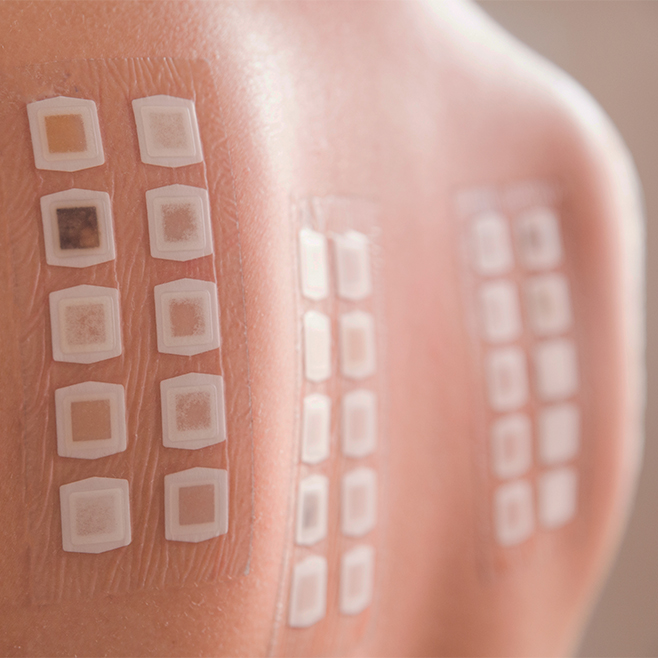What Is Contact Dermatitis?
Location
Midvalley Health Center
243 E 6100 S
Murray, UT 84107
Our highly trained dermatologists effectively diagnose and treat contact dermatitis in our clinic at University of Utah Health. Contact dermatitis is a skin disorder that occurs when a foreign substance (such as sunscreen or body lotion) comes into contact with your skin and an allergic reaction develops.
When a foreign substance touches your skin, your immune cells recognize the substance and may mistake it as harmful. As a result, your immune system will create more cells that will remember to attack this substance each time it touches your body and an allergic reaction will continue to occur.
Contact Dermatitis Symptoms
Contact dermatitis comes in many variations of severity. Sometimes, the skin disorder is localized to one place on your skin such as your eyelid or hand. The most common signs of contact dermatitis include:
- a rash that appears 24-96 hours after exposure to a substance;
- itching;
- a pink, red, or purple rash that is often swollen and scaly; or
- oozing and crusting over the rash.
Can Contact Dermatitis Spread?
It is possible for contact dermatitis to spread to other parts of your body. When the immune cells in our body are activated by the allergy, the cells may migrate and spread tthe rash.


Types of Contact Dermatitis Allergens
Our allergy clinic will help you accurately identify the specific allergen (substance that causes an allergic reaction) that is causing your dermatitis. We have thousands of allergens for testing. Each one is chosen based on the history of your rash.
The allergens we test for include (but are not limited to):
- fragrances,
- botanical oils,
- preservatives,
- sunscreens,
- rubber accelerators,
- surfactants (bubble-making chemicals),
- metals,
- topical medications,
- photoallergens (light sensitivity),
- plants (e.g. poison ivy),
- surgical adhesives,
- plastics and glues,
- cosmetic ingredients, and
- any of your own personal products brought to our clinic.
How Long Does Contact Dermatitis Last?
Due to the memory cells our bodies make, a contact dermatitis rash can recur or persist for up to 12 weeks after a single exposure to the substance.
Many times, our patients will try to identify the problematic substance (like shampoo or soap) and swap out the product for another. However, they are often unsuccessful in identifying the allergen and reducing their symptoms. If you've failed to identify the allergen or find relief for your symptoms, please call our office to schedule an appointment with one of our dermatologists.
Our Dermatologists
Kristin M. Leiferman, MD
Allergic Skin Diseases


What to Expect at Your First Appointment
Allergy Testing for Contact Dermatitis
It's often difficult to diagnose contact dermatitis without patch testing, especially if you've been struggling with it for a long time. Contact dermatitis and eczema (an inflammatory skin disorder that also causes rashes) look similar under a microscope. Sometimes, we will remove a small piece (biopsy) of the rash to differentiate between the two skin conditions.
We also use patch testing to find the allergen causing your contact dermatitis. During this procedure, we will place small strips of fabric tape on your back. Each piece of tape includes 10 allergens. On average, we test about 120 allergens per person. The substances we include in your patch test will be discussed with your dermatologist before we place the patches. You will need to keep the patches dry for the duration of the test (approximately five days).


Contact Dermatitis Treatment
We may prescribe you prednisone, an oral steroid that quickly eases symptoms caused by contact dermatitis. However, it has many side effects to consider, including:
- an increase in fluid retention,
- weight gain, irritability,
- insomnia,
- elevated blood glucose, and
- bone density loss.
When we identify the allergen, particularly if it’s a substance commonly found in your personal products, we will provide a personalized safe product list generated from the American Contact Dermatitis Society’s Contact Allergen Management Program.
How to Get Rid of Contact Dermatitis Fast
Unfortunately, there is no quick way to get rid of contact dermatitis. You will need to accurately identify the allergen, keep it from contacting your skin, and wait eight to 12 weeks for your skin's immune system to calm down. This is why it's important to seek out a skin specialist for persistent or recurring cases of contact dermatitis.
How to Prevent Contact Dermatitis
If you are at risk for contact dermatitis, you should avoid unnecessary chemicals in personal products, if possible. You should also cover your skin with clothing and gloves while using household cleaners or other products.
Contact Dermatitis Home Remedies
You can purchase over-the counter hydrocortisone cream or an antihistamine to relieve some of your symptoms until you are evaluated by a dermatologist.
How to Make an Appointment with Our Dermatologists
If you are a new patient, you will need a referral from your current provider. Your referral should include your demographic information, including your name, date of birth, home address, phone number, and insurance company.
Records about your allergy history should be mailed or faxed to U of U Health before your first appointment with us (see address and fax number below). These records should include:
- clinic notes,
- biopsy reports,
- lab reports,
- diagnostic tests, and
- treatments.
Please make sure your doctor sends your referral to:
University of Utah
Department of Dermatology
Attn: Contact Dermatitis Clinic
243 East 6100 South
Murray, UT 84107
(For patch test referrals, please add third floor to the address.)
Phone: 801-581-2955, please ask for patch testing or contact dermatitis scheduling
Fax: 801-261-8687
We review referral requests within 48 hours to make sure that the best dermatologist evaluates each case. We will contact new patients to schedule an appointment.






